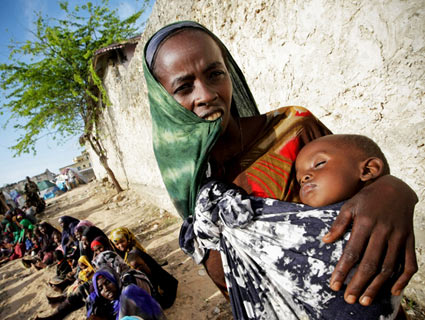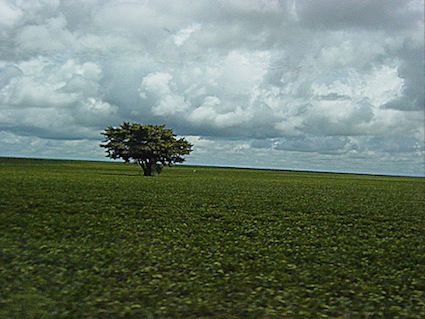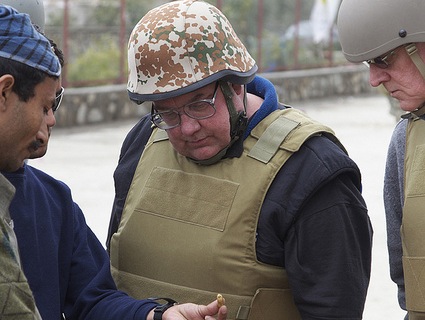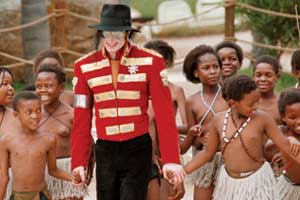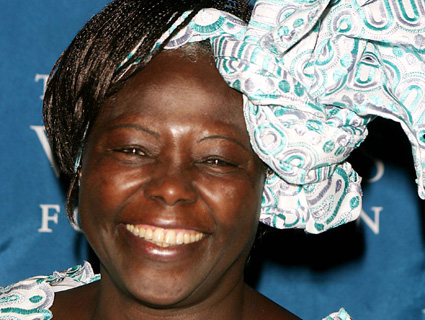
Wangari MaathaiJohn Barrett/Globe Photos/Zuma
Kenyan environmentalist Wangari Maathai died on September 25 in Nairobi. She spoke with Mother Jones in 2005, not long after she had received a Nobel Peace Prize.
In October, Kenyan environmentalist Wangari Maathai became the first African woman to be awarded the Nobel Peace Prize. The prize is the latest distinction in a 30-year career that’s been defined as much by Maathai’s accomplishments as the controversies she has sparked. After studying in the United States in the early 1960s, Maathai returned home to become the first East African woman to earn a Ph.D. Shortly afterwards, her parliamentarian husband initiated a messy divorce. She fought back by quitting her university deanship to run against him for his seat. Though she lost the race, she’d found her calling as a fiercely outspoken activist. In 1977, Maathai founded the Green Belt Movement, an environmental group that restored indigenous forests and assisted rural women by paying them to plant trees in their communities. It has since planted over 30 million trees in Kenya, provided work for tens of thousands of women, and been replicated in dozens of other African countries.
What made Maathai’s movement remarkable, and would eventually attract the attention of the Nobel committee, was how it erased the distinctions between environmentalism, feminism, democratization, and human rights advocacy. Maathai saw a direct connection between problems such as deforestation and soil erosion and the failures of Kenya’s one-party state. “I got pulled deeper and deeper and saw how these issues become linked to governance, to corruption, to dictatorship,” she says. Throughout the 1980s and ’90s, she boldly confronted the country’s ruling party and its autocratic president, Daniel Arap Moi. In their most visible showdown, Maathai led a successful campaign against Moi’s plan to build a 62-story party headquarters, complete with a larger-than-life statue of himself, in Nairobi’s Uhuru Park. Though her objections were largely environmental—the park was one of the city’s few open green spaces—it was clear that she also sought to humble a “Big Man” who was not used to being defied, especially by a woman.
Moi and his allies vilified Maathai as an overeducated, man-hating subversive. She received death threats, was arrested more than a dozen times, and once was beaten unconscious by police. Several of her colleagues were killed and the Green Belt Movement was nearly outlawed. In the early 1990s, while the government fomented a wave of violence against opposition figures and the ethnic groups believed to be supporting them, Maathai went in and out of hiding. Her public appearances, like the one I tried to attend in March 1993, were often broken up by police. Maathai recalls this period with characteristic equanimity, maintaining she was never demoralized. “I knew in my mind I was doing the right thing,” she says.
Indeed, during the past two years, Maathai has been vindicated. In December 2002, Moi stepped down and Kenya held its first democratic elections. The opposition swept to power in a landslide; Maathai was elected to parliament and was appointed assistant secretary for Environment, Wildlife, and Natural Resources. The Nobel Prize, she says, is further confirmation that Kenya is finally on the right path. The prize is also a tribute to the 64-year-old’s impact not simply as an environmentalist and activist, but as a role model for a generation of Kenyans who are enjoying the fruits of her labor. After the award was announced, she recalls, “Young people, especially girls, came up to me with tears in their eyes, saying how happy they were and how inspired they were.”
Wangari Maathai spoke to Mother Jones from New York, where she had started a short visit to the United States to celebrate her Nobel and promote her new book, The Green Belt Movement: Sharing the Approach and the Experience.
Mother Jones: What precipitated your moving beyond environmental issues to dealing with issues such as human rights and democracy?
Wangari Maathai: When I first started, it was really an innocent response to the needs of women in rural areas. When we started planting trees to meet their needs, there was nothing beyond that. I did not see all the issues that I have to come to deal with. For me, one of the major reasons to move beyond just the planting of trees was that I have tendency to look at the causes of a problem. We often preoccupy ourselves with the symptoms, whereas if we went to the root cause of the problems, we would be able to overcome the problems once and for all. For instance, I tried to understand why we didn’t have clean drinking water, which I had when I was a child. The link between the rural population, the land, and natural resources is very direct. But when you have bad governance, of course, these resources are destroyed: The forests are deforested, there is illegal logging, there is soil erosion. I got pulled deeper and deeper and saw how these issues become linked to governance, to corruption, to dictatorship.
MJ: When you raised these issues, you became persona non grata with the government. Do you think you were seen as more or less of a threat because you were a woman?
WM: I think that because I was a woman, I was vulnerable. It was easy to persecute me without people feeling ashamed. It was easy to vilify me and project me as a woman who was not following the tradition of a “good African woman” and as a highly educated elitist who was trying to show innocent African women ways of doing things that were not acceptable to African men. It was easy for me to be ridiculed and for both men and women to perceive that maybe I’m a bit crazy because I’m educated in the West and I have lost some of my basic decency as an African woman—as if being educated was something bad. That is something I had seen for a very long time: When people can’t use you, they ridicule what you represent. I was lucky that I understood that, because when one does not understand that, it is very easy to be broken and to be subdued.
MJ: At times, you had to go underground; you were arrested and beaten by the police. Why did this type of intimidation not work on you?
WM: I knew that I was not doing anything wrong, and I knew in my mind I was doing the right thing. I knew that the people who were going against me were not going against me for a good purpose. I knew that they were trying to justify their corruption and misgovernance.
MJ: Now that you are a Peace Prize winner, and a government minister and an MP, does anyone still see you as a threat?
WM: There will always be people who think that you have ambitions. But I think for most Kenyans right now, they are just so happy that after so many years of struggle that the world has recognized that work. My colleagues in parliament are very happy; the president has been extremely warm and congratulatory.
MJ: What about former president Daniel Arap Moi—has he contacted you or issued any kind of statement since you won the award?
WM: No. But I did see him recently at a wedding, and we chatted a little bit, but it was just a matter of pleasantry. I am quite sure that he always knew what I was doing was right, and that it was he and his supporters who were doing the wrong thing.
MJ: After so many years on the outside of government, have there been any surprises now that you’re on the inside?
WM: I’m a junior minister, so to a certain extent, I’m not in the inner inner circle. I think that for anybody who has worked in the civil society, government bureaucracy moves very very slowly. Though we have removed the [former] president and his ministers, with many of the civil servants who worked for him, sometimes I wonder they actually believe in the values that the new government came in with. Sometimes I feel frustration at the bureaucracy for not moving fast enough to deliver in the way that I would prefer. But that is probably because I have worked for many years in the civil society, which tends to move much faster than government.
MJ: During the early 1990s, Kenya experienced ethnic clashes, in which the government sponsored raids against tribes it identified as allies of the opposition. Do you think that era of divisive and violent ethnic politics has passed in Kenya?
WM: I certainly hope so. But we have never really gotten to the bottom of those tribal clashes. Those who were instigating them never have been questioned. A lot of the people who were displaced have not yet returned to their farms. But I do hope that sooner or later, those people will be able to go back to their land and the healing between those communities will be addressed. It is important for people to understand that those kinds of conflicts are actually utilized by politicians to achieve their own goals and that they should have no place in the Kenya we are trying to rebuild.
MJ: Do you think there are any lessons other countries might learn from Kenya’s democratization?
WM: One very good thing was the fact that the civil society in Kenya worked hard to educate the public on the need to change the government peacefully, on the need to demonstrate to the leaders that if they did not govern properly they can be removed—not by a gun, but through the vote. So I hope that’s a lesson that many African governments will learn. For us who are now in power, we need to be challenged to serve the people and ignore our own egos and personal interests so that we can really demonstrate to other African states that it is possible to share power without going to war. It is so much more difficult to rebuild once you have destroyed. We are seeing how difficult it is to resume normalcy in Somalia; we are seeing how difficult it is to bring the conflict to an end in the Sudan.
MJ: Some observers have predicted that Africa is entering a period where natural resources will be even more scarce in the years ahead, and that this will lead to more conflict. Do you agree with that theory?
WM: I haven’t seen any information that brings that conclusion. Of course, resources on the planet are limited, and limited resources can come to an end. But there are also a lot of resources that are renewable. A lot of land, for example, can be reclaimed from the encroaching deserts. There is a lot that we can do, if only our governments would embrace the kinds of activities that the Green Belt Movement has been promoting—mobilizing local people to do things such as protect the soil and rehabilitate degraded land. Really, you only need guidance and a lot of muscle energy—and we have a lot of people, millions of little hands that can be engaged in the reclamation of our lands. So I think the challenge, especially after the recognition of an African by the Nobel Peace Prize, is to prudently manage the resources that are available and avoid conflict.
MJ: In the past, you’ve spoken about how Africans need to shed Western stereotypes about themselves, what Kenyan author Ngugi wa Thiong’o called “decolonizing the mind.” How do these stereotypes affect your work?
WM: It would be good for us Africans to accept ourselves as we are and recapture some of the positive aspects of our culture. For example, when many of us who are elites go back home, we are unable to go to the rural areas and really help our people overcome poverty and underdevelopment. Instead, we want to live the kind of life we have experienced in the West. It is partly to sustain those lifestyles that we become corrupt. We refuse to share resources; we govern irresponsibly. If we are confident, if we have some of our cultural values, then we would be more committed to assisting our people out of poverty and creating an environment that can make it possible for our friends to assist us. We have a lot of friends in industrial countries, but sometimes they are not able to help us because we create an environment that really makes it hard to help our people.
MJ: But at the same time, doesn’t the West have problems with how it sees Africa? In the United States, for instance, there’s not much of an attention span for news from Africa.
WM: The outside world kind of likes to portray Africa like there is nothing positive. I don’t know whether it is deliberate, or whether people don’t want to see the positives. But there are a lot of wonderful initiatives that are being done by ordinary people that should be covered. But it is also true that we ourselves don’t project the positives. We’ve been struggling for 30 years, but quite often we didn’t even appear in the local newspapers, leave alone the international newspapers.
MJ: How did your childhood influence your career as an activist and an environmentalist?
WM: Growing up in a rural area and during a time when the country was very green greatly influenced me. But I think that perhaps I was impacted even more by my experience of coming to America at an early age. I have been helped a lot by the fact that I came to this country and spent five and half years here. I had a wonderful experience here in America, but I also accepted that I had a responsibility to go back and help my country. So those experiences really helped me go back to the country and say, ‘This is not the way things should be.” I am quite sure that if I had never left my country, I would not have had the same strong convictions that we need to have democratic space, freedom of movement, freedom of speech, freedom of association—all of the rights I was trying to embrace.
MJ: Has the controversy over the statements attributed to you about the origins of AIDS been cleared up to your satisfaction?
WM: For me, I didn’t have a problem because I never said what I was being told I had been saying. What is still my concern, of course, is the fact that this is a disease that has been devastating. What is really important is to educate people how to protect themselves and how to ensure that, despite their poverty, they can get tested and access drugs. So I just hope that those who can will make those drugs available.
MJ: Will you have a chance to relax in the near future?
WM: I definitely hope to relax when I get back hope. I will disappear into the forest and be rejuvenated by the beauty of the mountains.


